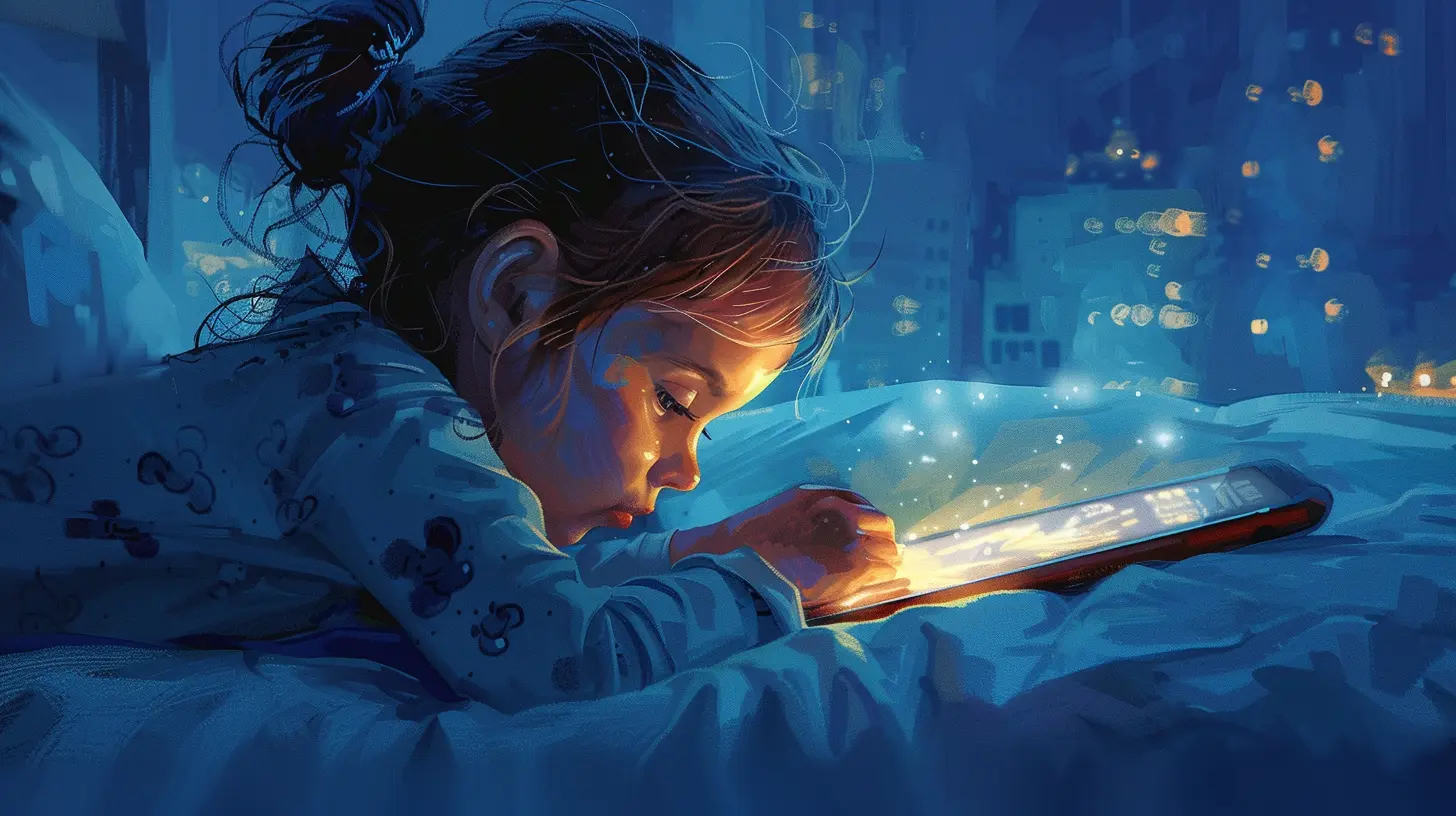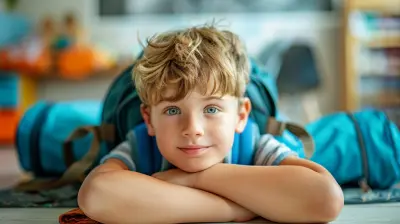Can Too Much Tech Affect Your Child’s Sleep?
13 August 2025
Let’s be honest—we live in a super-connected world. Tablets, smartphones, video games, smart TVs… the list goes on. Tech is pretty much everywhere, and for many families, it’s become the new “normal.” Our kids are growing up with technology in their hands before they even know how to tie their shoes.
But here’s the thing: while tech has its perks (educational games, virtual classrooms, family video chats), it can also come with some downsides. One of the biggest concerns parents have today? Whether all this screen time is messing with their children’s sleep.
Spoiler: it might be.
So grab a cup of coffee (or maybe a cup of herbal tea if it’s bedtime!), and let’s break this down together—with real talk, practical tips, and zero judgment.
Why Sleep Matters So Much for Kids
Before we dive into the tech talk, let's quickly go over why sleep is kind of a big deal for growing brains (and bodies).Remember those epic toddler meltdowns over socks being "too socky"? Yeah, lack of sleep can crank those up a notch. Sleep is when kids recharge, and not just in a “get energy” kind of way. While they’re snoozing:
- Their brains process memories and learnings from the day.
- Hormones that help growth kick in.
- Their immune systems strengthen.
- Emotions reset (because even tiny humans can have emotional hangovers).
Kids who get enough sleep tend to be more focused, handle their emotions better, and are just… well, easier to be around. So, yeah, sleep = essential.
The Link Between Screens and Sleepless Nights
Now, let’s talk tech. Ever tried to fall asleep right after bingeing a series or scrolling endlessly through TikTok? Your brain feels wired, right? That’s not just you—it’s rooted in science.1. Blue Light Blues
Screens—whether it’s a phone, tablet, or TV—emit blue light. This blue light messes with melatonin production. That's the hormone responsible for making us feel sleepy.Basically, when your kid’s eyes are glued to a screen close to bedtime, their body gets tricked into thinking it’s still daytime. The result? They stay awake longer, fall asleep later, or have trouble getting deep, restful sleep.
2. Mental Stimulation Overload
Let’s say your child just finished playing a high-speed car racing game or watching a fast-paced cartoon. Their brain is buzzing with excitement, their heart might be racing, and their imagination's running wild.That’s great for creativity—but not so much for calming down and falling asleep. Think of it like revving up an engine right before trying to park it in the garage.
3. Interruption Anxiety
Kids today are constantly “on.” Notifications, pings, alerts—these all create a low-grade anxiety. Even if they’re technically not using the device in bed, just having it nearby can disrupt sleep.Some older kids and teens even wake up in the middle of the night to check messages or social media. That’s like trying to nap on a rollercoaster. Not exactly peaceful.
Signs That Tech Might Be Affecting Your Child’s Sleep
Worried your kid isn’t getting enough rest? These signs could be pointing to screen-related sleep struggles:- Struggling to fall asleep at night
- Waking up often during the night
- Being groggy or grumpy in the morning (more than the usual “I hate waking up” attitude)
- Falling asleep during the day or in school
- Difficulty concentrating or unusually hyperactive
Sound familiar? Then it might be time to look at their screen habits more closely.
How Much Screen Time is Too Much?
Good question—and honestly, there’s no one-size-fits-all rule. But the American Academy of Pediatrics (AAP) suggests:- Under 18 months: Avoid screens except for video chatting with family.
- 18-24 months: Limited, high-quality programming with parent involvement.
- 2 to 5 years: No more than one hour a day of high-quality content.
- 6 and older: Set consistent limits that ensure screens don’t interfere with sleep, physical activity, and other healthy behaviors.
But here’s the trick: It’s not just about how much screen time they're getting—it’s also when they’re getting it.
Using screens too close to bedtime (within 1-2 hours) tends to have the biggest impact on sleep quality.
Tips to Help Your Child Sleep Better in a Tech-Filled World
Okay, now let’s get to the helpful stuff—because knowing the problem is only half the battle, right?Here are some tried-and-true strategies to help your child build healthier tech habits and catch better Zs:
1. Create a Screen Curfew
Set a "screens off" time at least an hour before bed. This gives your child’s brain a chance to wind down naturally. Instead, swap in calming activities like reading a book, drawing, or having quiet time.Make it a family rule so everyone (yes, even us parents!) does it together. Kids are way more likely to follow rules when we follow them too.
2. Keep Screens Out of Bedrooms
This one’s tough, especially with older kids, but it’s a game-changer. Try to keep devices like tablets, phones, and TVs out of the bedroom altogether. Charge them in the kitchen or living room overnight instead.It helps reduce temptations and creeping distractions.
3. Use Blue Light Filters
If evening screen time is unavoidable (hello, homework apps and FaceTiming grandparents), consider blue light filtering glasses or enabling night mode/dark mode on devices.It’s not a perfect solution, but it’s better than nothing.
4. Make Bedtime a Tech-Free Wind-Down Ritual
Establish a simple bedtime routine that doesn't involve screens. Think:- Warm bath
- Pajamas
- A bedtime story
- A few minutes of chatting about the day
- Night lights, cuddles, or soft music
Consistent rhythms like this help train your child’s brain to recognize when it’s time to power down.
5. Model the Behavior You Want to See
This one stings a little, but it’s true. If we want our kids to unplug at night, we’ve gotta show them how. That means putting away our own phones, turning off the TV, and being present in the moment.Kids may not always do what we say, but they’ll almost always do what we do.
What If My Child Can’t Sleep Without a Screen?
Ah, yes—this one comes up a lot. Many kids have gotten used to falling asleep with a tablet playing music, a show, or YouTube Sleep videos.If that’s your kid, don't panic. Habits can be unlearned with time and patience.
Try transitioning gradually:
1. Replace the video with an audio podcast or soothing bedtime story app.
2. Eventually transition to calming music or sound machines (like ocean waves or rainfall).
3. Keep the device out of bed and on a dresser instead.
And remember—any progress is progress, even if it’s slow.
What Science and Studies Say
Research keeps confirming what many parents have already suspected: screen use before bedtime is linked to poorer sleep in kids.For example:
- A study published in the journal Pediatrics found that children who use screens before bed sleep significantly less and experience more nighttime awakenings.
- Another study in JAMA Pediatrics observed that screen time—especially before bed—correlates with delayed bedtimes and reduced total sleep.
So no, it’s not just in your head. The science is real, and it backs up what many of us observe in our own homes.
When to Seek Help
If you’ve tried everything and your child is still struggling to sleep, it might be time to call in a professional. Sleep problems can be linked to anxiety, ADHD, or other underlying concerns.A pediatrician, child psychologist, or sleep specialist can help you figure out what’s going on and come up with a personalized plan.
And let me just say—there’s no shame in asking for help. We all need a team sometimes.
Final Thoughts: It’s Not About Perfection
Look, none of us are raising kids in a vacuum. We’re parenting in a digital age, and that comes with a unique set of challenges. You’re not a bad parent if your child uses screens. Tech is part of our world now, and it’s not going anywhere.The goal isn’t to banish technology, but to find balance. To help our kids make healthy choices. To protect their sleep—because a well-rested child is a happier, healthier child (and let’s be honest, it makes parenting a whole lot easier too).
Be patient. Be consistent. And give yourself grace while you navigate this.
You’ve got this.
all images in this post were generated using AI tools
Category:
Tech And KidsAuthor:

Steven McLain
Discussion
rate this article
1 comments
Corinne Kim
Great article! It’s so true—balancing screen time is tough. I've noticed my kids sleep better when we set tech-free hours. Thanks for the insights!
August 24, 2025 at 3:45 AM

Steven McLain
Thank you for your thoughtful comment! I'm glad you found the article helpful and that tech-free hours are making a difference for your kids' sleep.


